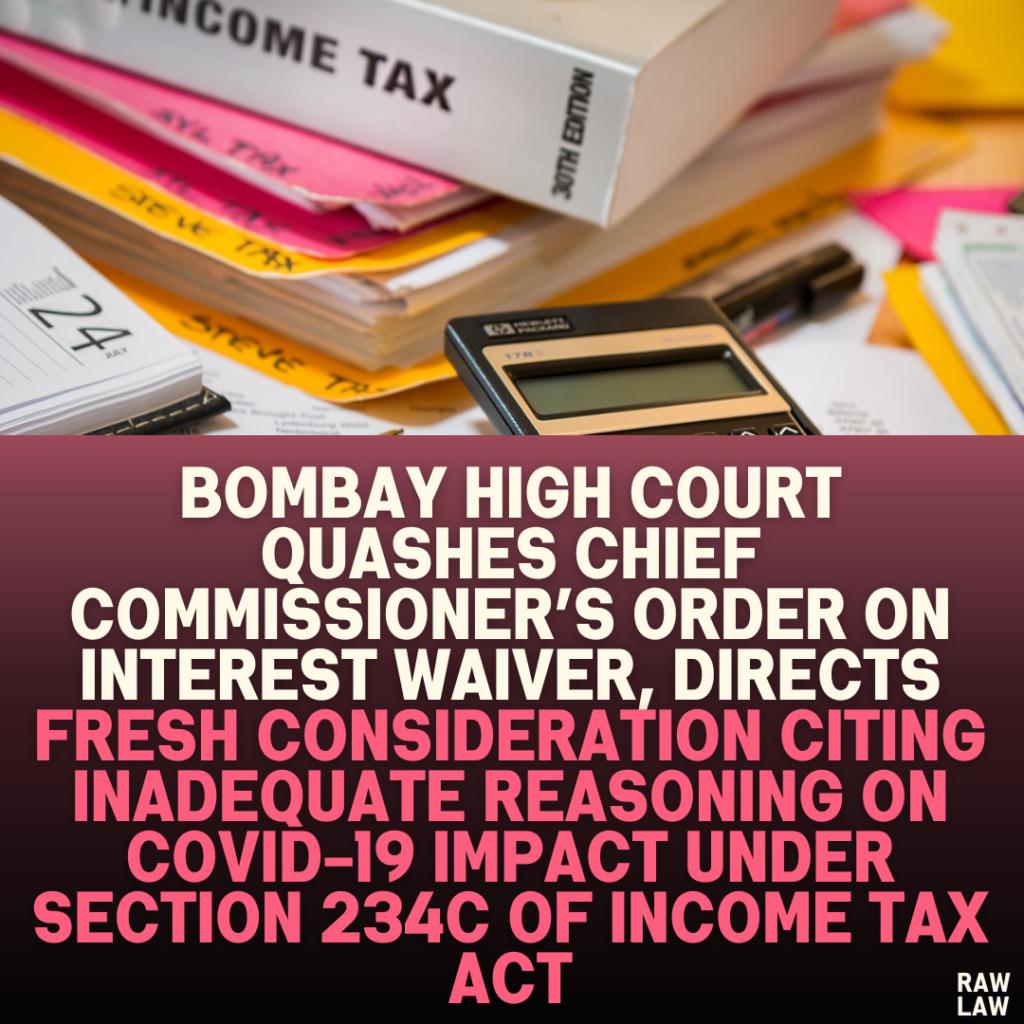Court’s Decision: The Bombay High Court set aside the Chief Commissioner’s order denying the petitioner a waiver of interest charged under Section 234C of the Income Tax Act. The court ruled that the Chief Commissioner failed to adequately consider the pandemic’s impact on the petitioner’s ability to estimate advance tax accurately. The case was remanded for a fresh decision, mandating that the respondent re-evaluate the waiver application based on the merits and observations made by the court, without being influenced by the previous order.
Facts: The petitioner, a corporate entity, filed a return of income for Assessment Year 2021-22, declaring an income of Rs. 3,65,12,48,710 with book profits at Rs. 11,57,63,40,425, and paid advance tax totaling Rs. 1,71,00,00,000 across four quarters. Due to unforeseen pandemic-related economic challenges, the petitioner was unable to pay the required advance tax within the due date for the July-September 2020 quarter, resulting in an interest charge of Rs. 3,88,59,353 under Section 234C. The petitioner sought a waiver of this interest, citing the extraordinary circumstances brought on by COVID-19, but the waiver request was rejected by the Chief Commissioner.
Issues: The primary issue was whether the Chief Commissioner appropriately exercised discretion in denying the waiver of interest under Section 234C, given the unprecedented impact of the COVID-19 pandemic on business operations and tax estimations.
Petitioner’s Arguments: The petitioner argued that the COVID-19 pandemic severely affected its business, making it challenging to estimate book profits accurately for advance tax payments. It contended that the pandemic’s impact constituted “failure to estimate” under Section 234C, justifying an interest waiver. The petitioner also referenced Sections 208 and 209, which govern advance tax obligations, and argued that the pandemic disrupted accurate estimations. The petitioner further cited directives from the Central Board of Direct Taxes (CBDT) allowing for interest waivers under certain conditions, along with judicial precedents, including a Supreme Court order extending statutory limitations during the pandemic and a Karnataka High Court decision in Bosch Limited v. ACIT supporting interest waiver requests in similar situations.
Respondent’s Arguments: The respondent opposed the waiver, asserting that the petitioner’s application was an afterthought, lacking merit. The respondent maintained that the waiver denial was reasonable and that the Chief Commissioner had properly exercised discretion. They argued that the petitioner’s inability to pay advance tax was not sufficiently justified and that the rejection order was a well-founded decision.
Analysis of the Law: The court examined Section 234C concerning interest charges on deferred advance tax payments, and the authority of the Chief Commissioner under Section 119 to provide waivers under specific circumstances, such as unforeseen hardships. The court also considered the CBDT’s 2006 directive on waiving interest in deserving cases, emphasizing that tax authorities must exercise discretion judiciously, especially under extraordinary circumstances like a pandemic.
Precedent Analysis: The court reviewed the Supreme Court’s extension of statutory limitations due to COVID-19 and the Karnataka High Court’s ruling in Bosch Limited, which supported interest waivers in instances where pandemic-related challenges hindered advance tax payments.
Court’s Reasoning: The court found that the Chief Commissioner’s order lacked adequate reasoning, particularly regarding the pandemic’s impact on the petitioner’s ability to estimate advance tax accurately. The court noted that the pandemic posed unprecedented financial challenges, and the waiver request should have been examined in light of these challenges, as per the petitioner’s arguments and supporting legal provisions.
Conclusion: The court quashed the impugned order and remanded the case for a de novo consideration of the waiver application by the Chief Commissioner, instructing that the application be decided on its own merits in accordance with the law and the observations made. The court specified that a reasoned order be issued, reflecting a detailed consideration of the petitioner’s arguments regarding the pandemic’s impact.
Implications: This decision underscores the importance of tax authorities exercising discretion with sensitivity to exceptional circumstances like the COVID-19 pandemic. It also reinforces the judiciary’s role in ensuring administrative decisions consider contextual hardships, especially in statutory interpretations that involve significant financial implications for taxpayers.
